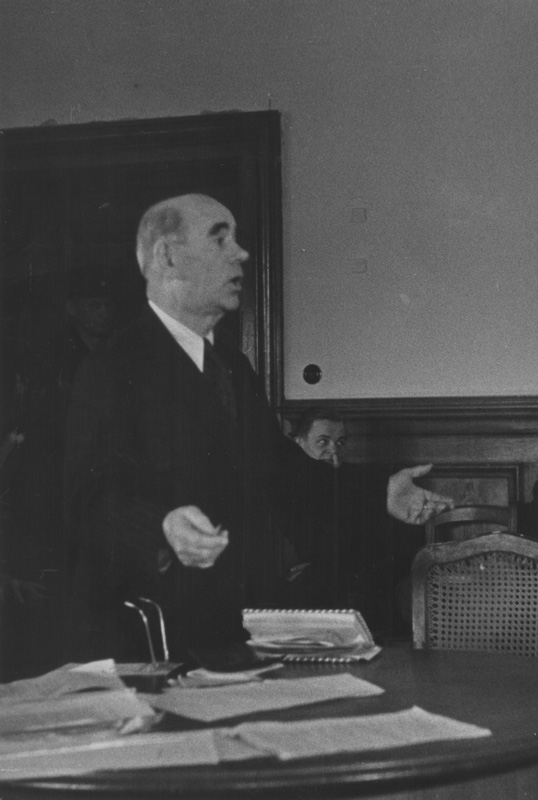Quellen
Sackett, Robert Eben: Popular entertainment, class, and politics in Munich, 1900-1923, Cambridge/Mass. u.a. 1982.
Sünwoldt, Sabine: Weiß Ferdl. Eine weiß-blaue Karriere, München 1983.
Admission free
Volkssänger, Humorist, Schauspieler

Der Volkssänger Ferdinand Weisheitinger (‚Weiß Ferdl’) vor der Münchner Spruchkammer VI, 27.10.1946 | Stadtarchiv München, NK-Stl-0101, Foto: Dana-Bilderdienst
Als uneheliches Kind einer Kellnerin wuchs Ferdinand Weisheitinger bei seiner Großmutter auf. Sie förderte sein Gesangstalent und schickte ihn auf die Domsingschule nach Salzburg. Anschließend machte er in Altötting eine Lehre als Schriftsetzer und ging dann 1902 auf Arbeitssuche nach München. Er fand Anschluss an verschiedene Volkssängergesellschaften und bekam 1907 sein erstes Engagement am „Platzl“, der Volksbühne gegenüber dem Hofbräuhaus. Dort wurde er schnell ein Star. Bis ihn ein Herzleiden 1943 zwang, seine Karriere zu beenden, trat er dort allabendlich vor ausverkauftem Haus auf. Seit 1921 war er auch Direktor der Bühne.
Auch für Weiß Ferdl, wie er sich nun nannte, war der Erste Weltkrieg eine Zäsur. Als Soldat verwundet, gründete er in einer Reserveeinheit eine Singspiel-Gesellschaft zur Truppenbetreuung. Erstmals hatte er hier mit eigenen Texten und Liedern Erfolg, in denen er dem kleinen Mann und einfachen Soldaten eine Stimme gab. Als Kriegsheimkehrer lehnte Weiß Ferdl die Revolution ab und schloss sich der rechten Einwohnerwehr an. Fortan verspottete er in seinen Auftritten die Weimarer Republik und beschwor die alte Ordnung ebenso wie die „nationale Erneuerung“. Bereits am 9.1.1922 trat er erstmals für die NSDAP bei deren „Großer Deutscher Weihnachtsfeier“ auf. Weiß Ferdl war mit NS-Größen wie Hermann Esser befreundet und rühmte sich seiner persönlichen Bekanntschaft mit Adolf Hitler.
In den dreißiger Jahren spielte er auch in zahlreichen Filmen mit und wurde einer der Vorzeige-Komiker des „Dritten Reichs“. Mitglied der NSDAP wurde er allerdings erst 1940. Dank seiner großen Popularität konnte er es sich leisten, auch kritische Texte zu schreiben und Witze auf Kosten von unpopulären Nationalsozialisten wie Hermann Göring zu reißen. Zuletzt wurde sogar ein Polizist als Zensor zu seinen Auftritten abgestellt.
Nach Kriegsende zunächst mit Auftrittsverbot belegt, stufte die Spruchkammer ihn, der er sich als Opfer des Faschismus und als Widerstandskämpfer präsentierte, im Oktober 1946 als Mitläufer ein und verurteilte ihn zur Zahlung von 2000 Reichsmark. Weiß Ferdl starb 1949, seit 1953 erinnert ein Brunnendenkmal auf dem Münchner Viktualienmarkt an ihn.
Sackett, Robert Eben: Popular entertainment, class, and politics in Munich, 1900-1923, Cambridge/Mass. u.a. 1982.
Sünwoldt, Sabine: Weiß Ferdl. Eine weiß-blaue Karriere, München 1983.